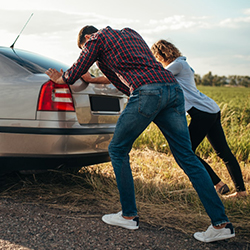
Your car has taken you everywhere from family gatherings, to work, road trips, day trips, and every errand and journey in between. You may even have a nickname for your vehicle, which is why it can be hard to make the decision to part ways. But, when circumstances change or when the maintenance costs become too much, it may be time to upgrade.
What Should I Consider Before Upgrading My Vehicle?
The reason for selling your car may fall under one of these categories: starting a family, changing lifestyles, cashing in on what value is left in your car, requiring a new car after an accident, or its failure. However, the process for finding a new car is relatively the same.
Determine your car's worth
Start by determining what value is left on your vehicle and whether it may be worth keeping for a while longer.
According to ConsumerReports, vehicles typically depreciate by 64% within the first five years and some even faster. That means a car that once cost $34,000 would lose $21,760 in value over that time period. So, would it be worth keeping? It depends.
If you have financed a large portion of the price of your car, there may be a fine line between when you can pay off the loan, the value that has depreciated, and the amount you can make by selling your vehicle. If you wait too long, your car may decrepitate so much that you can't use any of its value toward a reasonable trade-in or selling price.
ConsumerReports suggests that if the annual repair bill for your car exceeds a year's worth of car payments, then you should start considering an upgrade. On the other hand, making a few large repairs may still cost less than a new car and can keep your vehicle roadworthy.
Determine your car's resale value
Your car's resale value may vary from what you see online. Plug the make and model of your car into your search engine and see what similar vehicles are valued at. Remember to relate cars with a comparable year, number of kilometres, and history.
If your vehicle has been in an accident, it would generally affect the resale value. You should also disclose this to the future buyer. There are companies that can provide you with reports and documentation for this. You may also want to recommend the buyer has a pre-purchase inspection done on the car before they agree to the purchase.
To Trade-in or Sell Privately
You may want to get some money back for your car while it is still in usable condition. Most dealerships will offer you some money for a trade-in, but if your car has some value you may want to sell privately.
Although, trading in your car can save you the time and effort of finding the right buyer, and the money is used toward the purchase price of your new car.
To get the best price for your trade-in from a dealer:
- Consider the appearance: Having a clean, scratch-free car may help boost your trade-in value.
- Bring in comparable listings: Although dealers generally offer you a carefully calculated number for your car, you may be able to haggle if you have done your research.
If your car is roadworthy but a little worse for wear, you also have another option. Many charities will offer you a sizeable tax-receipt for your vehicle. It helps someone in need get from point A to Point B and you may see a higher return than you would from a trade-in.
What to Look for in a New Vehicle
When looking for a new vehicle make sure to do your research. Here is a list of qualities you may want to compare when seeking your next ride:
- Fuel efficiency: This can save you money year over year.
- Safety features: Some safety features, such as back-up cameras, are mandatory on new vehicles in Canada, while others are a bonus.
- Fastest depreciating vehicles: Lists of the fastest depreciating vehicles can be found online. Some cars can hold their value way longer than others.
According to iSeeCars.com, the Jeep Wrangler Unlimited holds its value the best, only depreciating by 30% over five years. The worst, the Maserati Quattroporte with an average five-year depreciation of 72.2%.
When to Buy Your New Car
Car dealerships typically offer their salespeople commissions and that means there are sales targets. This is how you can use them to your advantage:
- Shop late in the month: Targets are usually calculated monthly, quarterly, and yearly. This means you may be able to get a better deal while your salesperson is trying to make their monthly sales numbers.
- Shop late in the year: Not only are salespeople trying to make their final targets (monthly, quarterly, and yearly) but there are usually Black Friday or holiday deals as well.
Additionally, you may also save when the next year's model hit the floor. They'll want this year's model off the lot to make room for new inventory.
If you don't have the time to wait, try shopping during the week. The salesperson may have more time for you when the dealership is not as busy. This may work in your favour when negotiating.
New Cars and Insurance Rates
New cars typically come with a hefty price tag, so you'll want to make sure you're fully covered. Make comparing car insurance part of your vehicle purchase decision. That way you won't end up with an insurance premium you didn't expect after you've picked out your new car.
Compare auto insurance quotes at Kanetix.ca to find the best rate on your new vehicle.




